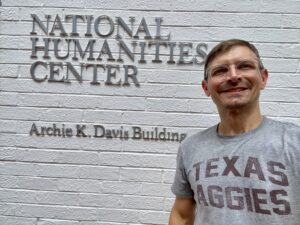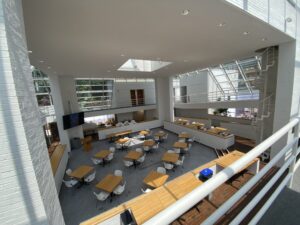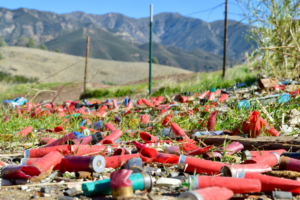Illuminating Humanities: John Patrick Casellas Connors

Dr. John Patrick Casellas Connors, Assistant Professor of Geography at Texas A&M University, at the National Humanities Center Archie K. Davis Building.
The Glasscock Center is excited to continue its series that highlights humanities research at Texas A&M and the vital role played by the humanities at the university and in the world beyond the academy.
For this highlight, we invite Dr. John Patrick Casellas Connors to tell us about his experience as a Summer Residential Scholar at the National Humanities Center (NHC) supported by the Glasscock Center (2024).
Dr. John Patrick Casellas Connors is an Assistant Professor in the Geography Department and faculty affiliate with the Race and Ethnic Studies Institute at Texas A&M University. As a broadly trained human-environment geographer, Dr. Casellas Connors’ research focuses on the social and political aspects of environmental management. Specifically, he examines how humans interpret and transform their environments and, in turn, are affected by those transformations. In a recently published article, “Activating uncertainty: Scientific evidence and environmental values in wildlife management,” Dr. Casellas Connors and his co-authors argue for greater engagement in the ethical and emotional dimensions of wildlife management decisions.
The Glasscock Center, in partnership with the College of Arts & Sciences, sponsors one humanities faculty member from Texas A&M each year to participate in the Summer Residential Scholar program at the National Humanities Center. The four-week long program assists scholars in jump-starting, or making substantial progress on, a current project. Dr. Casellas Connors, who participated in the program this past summer, says that “it really was such an amazing and unique opportunity to be able to really dedicate my attention to a single task.” Part of what made the experience so impactful for Dr. Casellas Connors was the supportive environment at the NHC fostered his fellow participants, guest speakers, and the Center’s staff.
“You're just surrounded by a lot of really interesting, intelligent people who really helped to develop some of my ideas during that short time,” he says. “Also the encouragement and support from both speakers that visited the center and the staff at the center, [they] offered a lot of ideas and insights on how to advance the work.”
The Summer Residential Scholar program ensures that participants have access to a variety of resources; a key resource for Dr. Casellas Connors was the NHC library staff who assisted participants in identifying and procuring sources to support their projects.

Inside the National Humanities Center Archie K. Davis Building.
“The incredible library staff helped me with archival components of the work that I have been developing this year,” he says. “They accelerated the work by helping me access and think about ways to get additional resources.”
Additionally, the NHC residency provides an all-inclusive experience, such as providing two meals a day and 24/7 access to individual study rooms, which allows participants to focus on their projects.
“The NHC provides a tremendous amount of freedom by having a space where you can work uninterrupted and not have to worry about the basic things like meals,” Dr. Casellas Connors says. “It frees up mental space to allow me to dedicate my attention to working on building my book.”
During his residency, Dr. Casellas Connors developed his manuscript, tentatively titled, The Nature of Guns, which explores the relationships between the politics of guns, the firearms industry, and conservation in the United States. Dr. Casellas Connors examines how the politics surrounding firearms in the U.S. has shaped the ways that lands and wildlife are managed. As a geographer, Dr. Casellas Connors is interested in how guns produce space in different ways.
“I am thinking about how guns shape relationships among people, the relationships of people to places, and how people use and access those spaces,” he says. “It's not just the debates over if guns are good or bad, or in what context are they good or bad. Rather, it’s about how guns are active in processes that construct space and order our world and society.”
The initial piece of Dr. Casellas Connors’ work investigated the changes in the Pittman-Robertson Wildlife Restoration Act of 1937, which directs funds from a tax on firearms and ammunition to state wildlife agencies. By digging into the history surrounding the changes—and the individuals who drove those changes—he seeks to understand the interwoven histories of gun politics and conservation politics over the past century in the United States. Recently, the U.S. Congress voted to expand states’ ability to use funds allocated by the Pittman-Robertson Wildlife Restoration Act towards the building, operation, and enhancement of public shooting or target range facilities. Dr. Casellas Connors sees this shift as important because the activities of wildlife agencies may shift from a primary focus on wildlife restoration and hunting to also include a focus on shooting sports.

Shotgun shells and other trash at an unmanaged shooting site in California. Image from the Los Padres Forest Watch.
“The fiscal dependence of wildlife agencies and conservation on revenue from the sale of firearms then affects the ways that agencies understand who they serve and what types of projects they undertake” Dr. Casellas Connors says. “So my work seeks to understand how our environmental organizations and policies are shaped by where they get their money from.”
While Dr. Casellas Connors’ NHC Summer Residential Scholarship has concluded, he continues to benefit from the experience and encourages anyone who is considering a Summer Residential Scholarship to pursue it. Dr. Casellas Connors is grateful for the Glasscock Center’s support of his residency, as well as the role the Center plays on campus.
“I'm very grateful for the Glasscock Center, in general, for continuing to provide such extensive support for research endeavors on campus,” he says. “The Glasscock Center’s support has affirmed the relevance of my work and helped me to position my research for greater impact in the humanities.”
